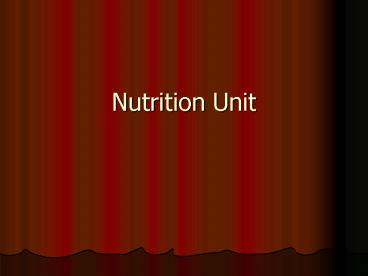Nutrition Unit - PowerPoint PPT Presentation
1 / 16
Title:
Nutrition Unit
Description:
Nutrition - Central Dauphin School District ... Nutrition Unit – PowerPoint PPT presentation
Number of Views:78
Avg rating:3.0/5.0
Title: Nutrition Unit
1
Nutrition Unit
2
Definitions
- Nutrition Eating foods the body needs to grow,
develop, and work properly. - Nutrients- The substances in food our body needs
to function properly. - Diet The food and drink we regularly choose to
consume (dietary habits). - Digestion-The breaking down of the foods we eat
into a form the body can use. - RDA-(Recommended Dietary Allowance) How much of a
certain nutrient you need each day. - Fiber- The indigestible part of foods we eat.
Found in fruits, vegetables and grains.
3
Factors That Influence Your Diet
- Geography
- Family/culture
- Convenience/fast foods
- Cost
- Advertising
- Friends
- Personal Taste
- Local Products
- Traditions
- Today
- Budget
- Big Money
- Peer Pressure (lunch)
- Preferences
4
Nutrients
- Your body uses some nutrients...
- To keep your body healthy.
- For energy.
- Your body can make some of the nutrients it
needs, but MOST come form the foods you eat. - There are 6 main categories of nutrients
- Carbohydrates , Proteins, Fats , Vitamins ,
Minerals , and Water
5
1. Carbohydrates
- The bodys main source of energy.
- 4 calories / 1 gram
- Two types
- 1.Simple Carbohydrates- Easy to digest. Quick
energy source - Fructose Fruit
- Lactose Milk
- Maltose Grain
- Sucrose Table Sugar
- 2.Complex Carbohydrates (starches)-
- Breads, pastas, rice, potatoes, nuts, vegetables,
legumes. - RDA 40 to 45 daily caloric intake.
6
2. Proteins
- They help build, repair, and maintain all the
body tissues. - 4 calories / 1 gram
- Made of chains of building blocks called amino
acids. - 22 different amino acids, your body can ONLY make
8 on its own. - 2 main sources
- 1.Animal Sources (Complete Proteins- contain all
22) - Fish, Meat, Poultry, Eggs, Milk, Cheese.
- 2.Plant Sources (Incomplete Proteins)
- Beans, Legumes, Seeds, Nuts (soy), tofu.
7
2-b. Proteins
- Main Function
- Vital to build and repair body cells.
- In enzymes proteins control rate of biochemical
reactions in cell body. - In hormones proteins regulate reactions.
- In antibodies proteins help identify and destroy
bacteria and viruses. - RDA 40 to 45 daily caloric intake.
8
3. Fats
- Are a great source of energy and essential for
vital body functions. - Are very important but only needed in small
amounts. Diets containing too much fat are linked
to weight gain and heart disease. - 9 calories / 1 gram
- Fats help to
- Insulate the body.
- Cushion the bodies organs.
- Carry fat-soluble vitamins.
- Promote healthy skin and normal growth.
9
3b. Fats/cholesterol-2 types
- 1.Saturated Fats (LDL)-bad cholesterol
- Tend to be solid at room temperature, Found in
meats and dairy products. - 2.Unsaturated Fats (HDL)-good cholesterol
- Found in vegetables and some fish.
- Liquid at room temperature.
- RDA 10 to 15 daily caloric intake.
10
4. Vitamins
- Help keep your body healthy and control body
functions, but do NOT provide energy. - Control many vital body processes. Work with
minerals. - Vitamins can be found in fresh vegetables,
fruits, nuts, and dairy products. - Many people take vitamins in the form of a pill,
this is ok. However, the best way to get your
vitamins is by eating a variety of fruits a
vegetables.
11
4b. Vitamins-2 types
- 1.Water-Soluble Vitamins
- Dissolve in water (excess is excreted in urine).
- Easily digested.
- Not stored in body tissues, you need to get them
everyday. - You can decrease vitamin loss by
- Cooking fruits and vegetables quickly.
- Steaming or using small amounts of water.
- Covering food during cooking.
- Using leftover fluid in soups and stews.
- 2.Fat-Soluble Vitamins
- Absorbed and transported by fat.
- Excess stored in fatty tissue.
- Excess can have toxic effects.
12
4c. Vitamins
Name What It Does For Your Body Where You Can Get It
Vitamin A Necessary for healthy hair. Carrots, Sweet Potatoes, Squash.
Vitamin B-12 Aids in concentration, memory, and balance. Fish, Milk, Eggs, Meat, Poultry.
Vitamin C Helps your body fight germs that cause illness. Orange Juice, Broccoli, Papaya.
13
5. Minerals
- Are essential for good health.
- Are very important, but only needed in small
quantities. - Are inorganic substances that the body can NOT
make. - Electrolytes Sodium, Chloride, and Potassium
- Lost through perspiration / must replenish.
- They become electrically charged when in body
fluids. - Electrolyte balance requires that the intake of
water and electrolytes is equal to the amounts of
water and electrolytes eliminated from the body.
14
5b. Minerals
Name Of The Mineral What It Does For Your Body Where You Can Get It
Calcium Necessary for healthy and strong bones. Milk, Cheese, Yogurt, Sardines.
Iron Necessary for your blood to deliver oxygen to your cells, prevents tiredness. Tofu, Spinach, Red Meat, Black eyed Peas.
15
6. Water
- Is the most essential nutrient.
- You can not survive more than a few days without
water. - Your body is almost 70 water.
- What water does for you
- Carries nutrients and waste products throughout
your body cells. - Helps regulate body temperature.
- Coolant (Perspiration/Sweat)
- Fills the spaces between cells which are made
mostly of water. - Helps lubricate your joints.
16
6b. Water
- You should drink 8 to 10 glasses of water per
day. - Many foods also contain water
- Fruits, Vegetables, Milk (75 water)
- Poultry and Meat (50 to 60 water)
- Grain Products (5 to 35 water)
- Lack of water can lead to
- A poor functioning body.
- Dehydration, the drying out of the body.
- Fainting.
- Death (Extreme Cases).































